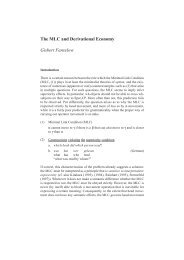'Split wh-constructions in Classical and Modern Greek'
'Split wh-constructions in Classical and Modern Greek'
'Split wh-constructions in Classical and Modern Greek'
You also want an ePaper? Increase the reach of your titles
YUMPU automatically turns print PDFs into web optimized ePapers that Google loves.
we cannot at this po<strong>in</strong>t back up our conclusion with statistical<br />
evidence the generalisation seems to be that the construction is<br />
register specific.<br />
As for the speakers of Grammar A for <strong>wh</strong>om both <strong>in</strong>terpretations<br />
are available we further claim that may have two or more<br />
compet<strong>in</strong>g grammars <strong>in</strong> the sense of Kroch (1989).<br />
As a f<strong>in</strong>al remark we want to po<strong>in</strong>t out that this k<strong>in</strong>d of<br />
‘<strong>in</strong>ternalised diglossia’ (Lightfoot 1999) represents an <strong>in</strong>terest<strong>in</strong>g<br />
approach to the learnability problem concern<strong>in</strong>g the acquisition<br />
of optional operations s<strong>in</strong>ce alternations are diachronically unstable<br />
<strong>in</strong> language <strong>and</strong> represent a transition <strong>wh</strong>ereby one of the<br />
grammars falls <strong>in</strong>to disuse.<br />
4 Conclusions<br />
To conclude: the idea that we put forward is that DP-splitt<strong>in</strong>g is<br />
possible <strong>wh</strong>en two DPs (one of <strong>wh</strong>ich is a null head modifier)<br />
are generated <strong>in</strong> apposition. DP-splitt<strong>in</strong>g is no longer possible<br />
<strong>wh</strong>en the two DPs merge <strong>in</strong>to one. This correlates with a change<br />
<strong>in</strong> the D-system, i.e. determ<strong>in</strong>ers become agreement markers. An<br />
additional claim was made <strong>in</strong> order to account for the availability<br />
of splitt<strong>in</strong>g <strong>in</strong> the case of adjectives, quantifiers such as many<br />
<strong>and</strong> no <strong>and</strong> demonstratives on the one h<strong>and</strong>, <strong>and</strong> the non-availability<br />
of splitt<strong>in</strong>g with <strong>wh</strong>-structures on the other. The hypothesis<br />
that we proposed for MG is that adjectives, quantifiers such<br />
as many <strong>and</strong> no <strong>and</strong> demonstratives can split because they are<br />
modifiers, <strong>wh</strong>ereas the <strong>in</strong>terrogative ti is no longer a modifier <strong>in</strong><br />
MG (it was once <strong>in</strong> CG), but a determ<strong>in</strong>er. The fact that splitt<strong>in</strong>g<br />
is possible with t<strong>in</strong>os (‘<strong>wh</strong>ose’) is due to the fact that it is a<br />
‘learnèd’ construction <strong>in</strong> the sense of Pounta<strong>in</strong> (1998). We have<br />
argued <strong>in</strong> pass<strong>in</strong>g that focus <strong>in</strong> MG was licensed at PF rather<br />
178

















